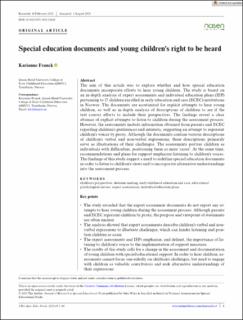| dc.contributor.author | Franck, Karianne | |
| dc.coverage.spatial | Norway | en_US |
| dc.date.accessioned | 2023-10-10T08:10:09Z | |
| dc.date.available | 2023-10-10T08:10:09Z | |
| dc.date.created | 2023-08-18T13:34:03Z | |
| dc.date.issued | 2023-08 | |
| dc.identifier.citation | Journal of Research in Special Educational Needs. 2023, 1-10. | en_US |
| dc.identifier.issn | 1471-3802 | |
| dc.identifier.uri | https://hdl.handle.net/11250/3095381 | |
| dc.description.abstract | The aim of this article was to explore whether and how special education documents incorporate efforts to hear young children. The study is based on an in-depth analysis of expert assessments and individual education plans (IEP) pertaining to 17 children enrolled in early education and care (ECEC) institutions in Norway. The documents are scrutinized for explicit attempts to hear young children, as well as in-depth analysis of descriptions of children to see if the text convey efforts to include their perspectives. The findings reveal a clear absence of explicit attempts to listen to children during the assessment process. However, the assessments include information obtained from parents and ECEC regarding children's preferences and interests, suggesting an attempt to represent children's voices by proxy. Although the documents contain various descriptions of children's verbal and non-verbal expressions, these descriptions primarily serve as illustrations of their challenges. The assessments portray children as individuals with difficulties, positioning them as mere ‘cases’. At the same time, recommendations and plans for support emphasize listening to children's voices. The findings of this study suggest a need to redefine special education documents in order to listen to children's views and to incorporate alternative understandings into the assessment process. | en_US |
| dc.description.abstract | Special education documents and young children's right to be heard | en_US |
| dc.language.iso | eng | en_US |
| dc.publisher | Wiley & Sons Ltd | en_US |
| dc.rights | Navngivelse 4.0 Internasjonal | * |
| dc.rights.uri | http://creativecommons.org/licenses/by/4.0/deed.no | * |
| dc.subject | children's perspective; | en_US |
| dc.subject | decision-making; | en_US |
| dc.subject | early childhood education and care; | en_US |
| dc.subject | educational psychological service; | en_US |
| dc.subject | expert assessments; | en_US |
| dc.subject | individual education plans | en_US |
| dc.title | Special education documents and young children's right to be heard | en_US |
| dc.title.alternative | Special education documents and young children's right to be heard | en_US |
| dc.type | Peer reviewed | en_US |
| dc.type | Journal article | en_US |
| dc.description.version | publishedVersion | en_US |
| dc.rights.holder | ©2023 Authors | en_US |
| dc.subject.nsi | VDP::Samfunnsvitenskap: 200::Pedagogiske fag: 280::Spesialpedagogikk: 282 | en_US |
| dc.source.pagenumber | 1-10. | en_US |
| dc.source.journal | Journal of Research in Special Educational Needs | en_US |
| dc.identifier.doi | 10.1111/1471-3802.12620 | |
| dc.identifier.cristin | 2167992 | |
| cristin.ispublished | true | |
| cristin.fulltext | original | |
| cristin.qualitycode | 1 | |

